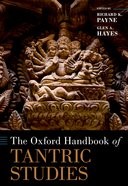 The Oxford Handbook of Tantric Studies
The Oxford Handbook of Tantric Studies
Contents
-
-
-
-
-
-
-
-
-
-
-
-
-
-
-
-
Approaching the Study of the Vaiṣṇava Sahajiyās Approaching the Study of the Vaiṣṇava Sahajiyās
-
Vaiṣṇava Sahajiyā Appropriations of Gauḍīya Vaiṣṇavism Vaiṣṇava Sahajiyā Appropriations of Gauḍīya Vaiṣṇavism
-
Sādhana Is a Journey: Conceptual Metaphors and Cognitive Domains Sādhana Is a Journey: Conceptual Metaphors and Cognitive Domains
-
Categories of Metaphors Categories of Metaphors
-
Ponds and Rivers: Container and Conduit Metaphors Ponds and Rivers: Container and Conduit Metaphors
-
Crooked Rivers and Forest Groves: Primary and Complex Metaphors Crooked Rivers and Forest Groves: Primary and Complex Metaphors
-
Sahaja and Emergent Structure: Conceptual Blending Theory Sahaja and Emergent Structure: Conceptual Blending Theory
-
The Dynamics of “Vital Relations” in Conceptual Blending The Dynamics of “Vital Relations” in Conceptual Blending
-
Types of Conceptual Integration Networks Types of Conceptual Integration Networks
-
Tantra and Bhakti as Cognitive Frames for Conceptual Blending Tantra and Bhakti as Cognitive Frames for Conceptual Blending
-
Concluding Thoughts Concluding Thoughts
-
Notes Notes
-
References References
-
-
-
-
-
-
-
-
-
-
-
-
30 Exploring Metaphors and Conceptual Blending in Vaiṣṇava Sahajiyā Texts
Get accessGlen A. Hayes, Bloomfield College of Montclair State University
-
Published:18 July 2023
Cite
Abstract
This chapter will explore an important seventeenth-century Vaiṣṇava Sahajiyā text on transgressive ritual practices and visualization involving the divine body (deva-deha): the Amṛtaratnāvalī (Necklace of Immortality) of Mukunda-dāsa. Because the Bengali language used in this text is largely uninflected and enigmatic, and there are no extant written commentaries to guide its study, the chapter will demonstrate how approaching the translation based on the underlying metaphors can give us a richer understanding of this problematic, yet fascinating, text. As the Sahajiyās were influenced by traditions from both Tantra as well as bhakti, the chapter will use conceptual metaphor theory and conceptual blending theory to better understand this complex language. This approach utilizes insights from the study of conceptual metaphors first developed by George Lakoff and Mark Johnson, as well as the process of conceptual blending first presented by Gilles Fauconnier and Mark Turner.
Sign in
Personal account
- Sign in with email/username & password
- Get email alerts
- Save searches
- Purchase content
- Activate your purchase/trial code
- Add your ORCID iD
Purchase
Our books are available by subscription or purchase to libraries and institutions.
Purchasing information| Month: | Total Views: |
|---|---|
| July 2023 | 12 |
| August 2023 | 3 |
| October 2023 | 2 |
| November 2023 | 3 |
| January 2024 | 5 |
| February 2024 | 1 |
| March 2024 | 8 |
| April 2024 | 2 |
| May 2024 | 4 |
| July 2024 | 2 |
| August 2024 | 2 |
| October 2024 | 2 |
| November 2024 | 4 |
| December 2024 | 9 |
| January 2025 | 2 |
| February 2025 | 3 |
| March 2025 | 4 |

Get help with access
Institutional access
Access to content on Oxford Academic is often provided through institutional subscriptions and purchases. If you are a member of an institution with an active account, you may be able to access content in one of the following ways:
IP based access
Typically, access is provided across an institutional network to a range of IP addresses. This authentication occurs automatically, and it is not possible to sign out of an IP authenticated account.
Sign in through your institution
Choose this option to get remote access when outside your institution. Shibboleth/Open Athens technology is used to provide single sign-on between your institution’s website and Oxford Academic.
If your institution is not listed or you cannot sign in to your institution’s website, please contact your librarian or administrator.
Sign in with a library card
Enter your library card number to sign in. If you cannot sign in, please contact your librarian.
Society Members
Society member access to a journal is achieved in one of the following ways:
Sign in through society site
Many societies offer single sign-on between the society website and Oxford Academic. If you see ‘Sign in through society site’ in the sign in pane within a journal:
If you do not have a society account or have forgotten your username or password, please contact your society.
Sign in using a personal account
Some societies use Oxford Academic personal accounts to provide access to their members. See below.
Personal account
A personal account can be used to get email alerts, save searches, purchase content, and activate subscriptions.
Some societies use Oxford Academic personal accounts to provide access to their members.
Viewing your signed in accounts
Click the account icon in the top right to:
Signed in but can't access content
Oxford Academic is home to a wide variety of products. The institutional subscription may not cover the content that you are trying to access. If you believe you should have access to that content, please contact your librarian.
Institutional account management
For librarians and administrators, your personal account also provides access to institutional account management. Here you will find options to view and activate subscriptions, manage institutional settings and access options, access usage statistics, and more.